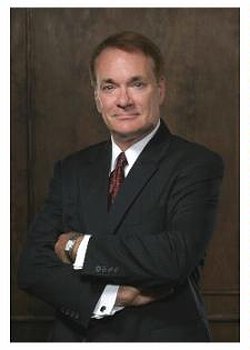GSBLSU Favorite Class: Negotiate to Win for Bankers
About the Professor: Jim Thomas
 Jim Thomas is a Washington, D.C. attorney, speaker, trainer, and author. Throughout his 35 years of practicing law, Jim has specialized in negotiation, garnering himself a reputation as one of the nation’s best. His experience includes mergers and acquisitions, arms control, labor relations, domestic and international business transactions, trade and diplomacy, and more. His impressive client list includes the majority of the Fortune 500.
Jim Thomas is a Washington, D.C. attorney, speaker, trainer, and author. Throughout his 35 years of practicing law, Jim has specialized in negotiation, garnering himself a reputation as one of the nation’s best. His experience includes mergers and acquisitions, arms control, labor relations, domestic and international business transactions, trade and diplomacy, and more. His impressive client list includes the majority of the Fortune 500.
The name of the course and the content is directly from Jim’s book and Workshop series by the same name: Negotiate to Win. First published in 2005, the book is a HarperCollins international bestseller, available in 18 languages around the globe. He can often be found as a guest commentator on a number of radio and network news programs and is often invited to speak at events worldwide. He is a partner in a Washington, D.C. law firm, a principal in a California venture capital firm, and a member of the faculty at The Georgetown University Law Center, the University of Washington’s Pacific Coast Banking School, and GSBLSU.


 About the Instructor:
About the Instructor: In the commercial banking industry, changes have been coming more and more quickly. At GSBLSU, we have researched and conferred with others in the banking education arena to determine the best subject matter to present to students in the 2015 session of GSBLSU. After careful consideration, GSB has decided to implement a few changes and additions to the courses offered for all classes of students.
In the commercial banking industry, changes have been coming more and more quickly. At GSBLSU, we have researched and conferred with others in the banking education arena to determine the best subject matter to present to students in the 2015 session of GSBLSU. After careful consideration, GSB has decided to implement a few changes and additions to the courses offered for all classes of students. The Graduate School of Banking at LSU is now on Twitter! You can find us
The Graduate School of Banking at LSU is now on Twitter! You can find us 
 The newest issue of the Graduate School of Banking at LSU’s BancGrad Newsletter has just been published!
The newest issue of the Graduate School of Banking at LSU’s BancGrad Newsletter has just been published! In this rapidly changing financial environment, maintaining a relevant banking education program is indeed challenging. It is important to educate young leaders how the present system functions, but that is not enough. A relevant program must address environmental changes, both current and potential.
In this rapidly changing financial environment, maintaining a relevant banking education program is indeed challenging. It is important to educate young leaders how the present system functions, but that is not enough. A relevant program must address environmental changes, both current and potential.